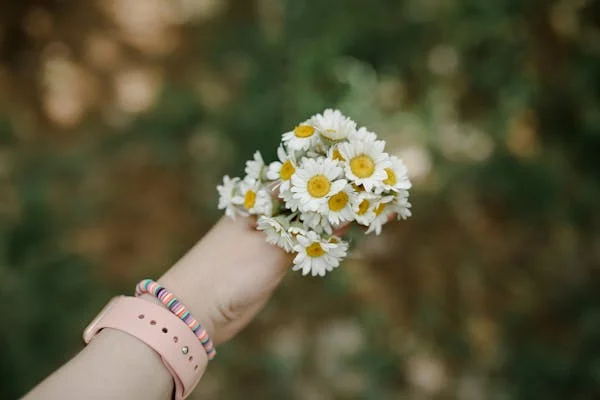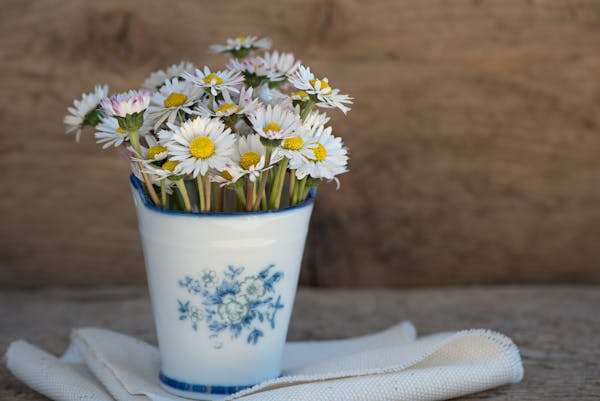Daisy Flower Meaning: A common, beautiful, and unpretentious daisies have been the inhabitants and the decoration of our gardens for centuries. These flowers are predominately white with tiny yellow blotches in the center. What could be more innocent and happy than them? But as for them, the beauty is deeper, and there is much more in their message than the meeting of the eye. The present article consists of information regarding significant and meaningful daisies, their cultivation, and the meanings hidden in their petals.
What does the Daisy Flower mean?
At its absolute base, the daisy flower meaning is strongly connected with purity, babylike virginity, and rebirth. Again, these attributes can be seen in relation to a number of cultural and historical periods, during which people appreciated the daisy flower as a symbol of purity and as having the ability to withstand harsh climatic restring.
The very name Daisy gives a clue regarding its meaning. They are called so from Old English ‘day’s eye’ for these flowers shut during the night and blossom at dawn. Daily use of daisies has made people link this flower with the breaking of new dawns and opportunities.
Fluorography, a language of flowers, recognizes the daisy flower as a symbol of loyal love as well as thinking that is pure and complex. The said attributes have seen daisies used in conveying real affection and genuine sentiments or feelings of the heart.
What Daisy Flowers Symbolize
The symbolism of daisies is multifaceted, reflecting various aspects of human experience and natural cycles:
Innocence and Purity:
Traditionally, a simple and innocent white flower, which is common daisy, has been associated with purity and an innocent, childlike beauty.
New Beginnings:
Coming in the category of spring flowers, daisies symbolize new beginnings, or in another perspective, new hope is denoted by this flower.
True Love:
Romantic divination, of course, did not begin in Victorian times, and it appears that daisies were also used in this way during this period. Sweethearts would pull a flower’s petals, saying, “He loves me, he loves me not,” in an attempt to know their future in as far as love is concerned.
Simplicity and Modesty:
Of all flowers, daisies’ simple aesthetics have earned them the associations of plain refinement and simplicity.
Fertility and Motherhood:
In others, it is connected to fertility deities, which make daisies symbolic of creation and mothering.
Biased the daisy flower meaning in these contexts complicates the beauty of these flowers we associate with basic flowers. Assorted as gifts or grown locally, daisies convey such messages; therefore, these are not just beautiful flowers.
How to Plant Daisies
If cultivation is able to bring the daisy flower meaning into your own space, then the experience can be quite fulfilling. Here’s how to successfully plant these delightful flowers:
Choose the Right Location:
Daisies are sunlovers that grow in a wide range of parts sun to shade. Your planting site should be decided based on the fact that it should have direct sunlight for at least six hours per day.
Prepare the Soil:
A favorable condition for cultivation includes falling fertile soil with good drainage. Prepare the garden bed to fix the issue of poor drainage or poor quality of the soil by adding compost.
Timing Matters:
Daisy plants can be grown any time of the year, but the best time to plant would be in the spring or in the fall. In the tropical regions of the world, the planting done in the fall is beneficial since the roots get a chance to set before the heat of the year begins.
Proper Spacing:
Plant your daisies with appropriate space to develop where they should be planted a distance of 6-8 inches apart. This provides space for air to circulate within it and reduces instances of the diseases that may affect society.
Watering:
Water after planting and maintain frequent moderate watering when the soil is still slightly damp because the plants have just been sown.
Mulching:
You will need to maintain a layer of organic mulch around the plants to help maintain a form of moisture and prevent weed growth, which will help your daisies grow well.
How to Care for Daisy Plants
To make better use of the daisy flower in your garden, proper care is very important. Here’s how to keep your daisies healthy and blooming:
Watering:
After it becomes established, daisy requires minimal water to sustain it as it moderately grows under drought conditions. Water and fertilizer heavily at the time of planting and once again in the middle of a season, but do not water again until the soil dries slightly.
Fertilizing:
Usually, daisies require an all-purpose balanced fertilizer. This should be applied in early spring and midsummer to encourage growth and flowering.
Deadheading:
Deadhead to encourage continued flowering and to avoid the formation of seedheads in this tender perennial. It also assists the plant to save the energy that is used for the growth of more flowers.
Division:
Daisy-like plants very frequently become overcrowded; it is better to divide them every 3-4 years in the spring or in the fall. This revitalizes growth and development of the plant and even improves on aspects of growth that were probably not stimulated prior to it.
Winter Care:
Sometimes, put a layer of mulch around the plants at the end of the fall to prevent damage by the process of freeze-thaw cycles common in cold areas.
Pest and Disease Management:
Watch out for pulse diseases such as aphids or a leaf spot. Some issues require immediate intervention using the right organic or chemical input to control diseases affecting the plant.
If you want to provide your daisies with these care essentials, you will be able to help your blooms grow—and the qualities that go with them—to their fullest.
Culture and art importance of daisies and the deeper meaning of this simple flower
Its daisy flower meaning also extends beyond the garden and places its stamp in various domains of culture and art. According to popular lore, ‘daisies’ are purity tokens that find mention in everything from Shakespeare to nursery rhymes. When it comes to flowers, perhaps the most universally appreciated type of flower is the Daisy, and it has been used in artwork for many centuries.
Folklore and mythology involve the daisy in a wide variety of ways. Another claim relates them to the Freya, a Norse goddess of love and fertility, while the Celts trust that daisies are spirits of stillborn children. These ethereal bonds make us appreciate the meaning of daisy flower meaning more because the flower represents different things to different people in several cultures and in religion.
Daisies in Modern Times
Today, the daisy flower meaning remains not only relevant but truly necessary in our frantic world. Daisies have symbols associated with simplicity and purity, and as such they serve to encourage people to enjoy simple things in life. Because they are associated with a new beginning, people use them in activities such as weddings when people are starting a new life or when moving to new homes, among others.
When it comes to natural remedies and aromatherapy, the Daisy extracts might be used for calming down effects, and the symbol of this flower is innocence and tenderness. This modern use of the daisy flower meaning establishes how even early symbolism can translate to modernity as practiced today.
Conclusion
The daisy flower meaning has a biblical connection and can refer to many things, including purity, starting over, and fidelity. Besides, by being conscious of these meanings, one can purposely cultivate daisy flowers, not only having in mind the looks but also everything the daisy flowers may bring into our gardens and our lives.
It doesn’t matter if you are planting daisy flowers to make a garden, you are buying flowers for a loved one, or you just see them in a field; you need to bear in mind the symbolism of daisy flowers. At the same time, in their elegance, they give a powerful message of the four seasons in human life: the birth, the power of movement forward, and the practicality and ease of construction with no frills.
Whenever these daisy flower meanings enter our lives, we are reminded of the subtlety associated with these blooms. May the daisies in your world keep on blooming and bringing happiness, hope, and simplicity into your life.
Related articles:
FAQs
Is there such variety of the daisy that means different in relation to the other?
Indeed, the balsam or the Arizona daisy can be dated back to the Victorian era, and their meaning has nothing to do with innocence—far from it. For example, gerbera daisies that bear bright colors are mostly only associated with happiness. Learning more about the different types of daisies adds another level of appreciation for daisy flower meaning and lets you find the right flower for such purposes as conveying a message of love or taking a lacy to an important event like a wedding or birthday.


